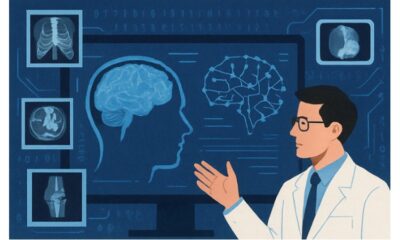Book
Addressing Healthcare System Defects: A Closer Look at Doctors’ Rights in America
The healthcare system in America is a complex and ever-evolving landscape that plays a crucial role in the well-being of its citizens. However, amidst its many strengths, there exist defects that have profound implications for both patients and healthcare professionals. In this article, we will shine a spotlight on the defects in America’s healthcare system, with a specific focus on the rights of doctors. By examining these issues, we aim to raise awareness, foster dialogue, and advocate for meaningful changes that will ultimately benefit both the medical community and those seeking healthcare services.
Understanding Healthcare System Defects
America’s healthcare system is known for its world-class advancements in medical technology and innovation. However, it is not without its flaws. Issues such as skyrocketing healthcare costs, limited access to care, bureaucratic complexities, and fragmented delivery systems have resulted in a suboptimal healthcare experience for many individuals. These defects often place an undue burden on healthcare providers, including doctors, who are at the forefront of patient care.
The Rights of Doctors
Within the healthcare system, doctors serve as the backbone, dedicating their skills, expertise, and compassion to improving the health and well-being of their patients. However, it is crucial to acknowledge and address the rights of doctors as they navigate the complexities of their profession. These rights include fair compensation, legislative support, a conducive work environment, autonomy in decision-making, protection against burnout, and the ability to provide high-quality care without undue interference. Even the grievance processes the physicians initiate leave them little control over those processes. For example, if a physician requests a hearing, the hospital get to choose the hearing committee members and hearing officer. Understanding how the self-governance damages the healthcare system by giving more power to the hospital administrations and medical executive committees, and not leaving an individual physician at the mercy of the few who can gang-up against one, is essential for ensuring the well-being and professional satisfaction of doctors, which, in turn, translates into better patient outcomes. If we consider the cost of becoming a physician our students end up with massive debts by the time they are able to practice their passion. The complexities of navigating the system and the student loans work hand-in-hand in poor job-satisfaction. It is no surprise then, that we have a shortage of physicians and fewer students are opting for medical careers.
Challenges and Solutions
Doctors face a myriad of challenges within the healthcare system, including heavy workloads, administrative burdens, insurance-related complexities, and limited control over treatment decisions. All other entities involved in the healthcare system- insurance companies, hospitals and hospital administrators, pharmaceutical industry, and government agencies- although provide no direct care have large influence and therein lies the frustrations of the physicians. These challenges can have a significant impact on their professional fulfillment and overall job satisfaction. To address these issues, collaborative efforts are needed. This includes advocating for healthcare reforms that prioritize patient-centered care, reducing bureaucratic burdens, streamlining insurance processes, and providing support systems to combat burnout
Additionally, fostering a culture of collaboration and respect between healthcare providers, administrators, insurers, and policymakers is crucial. By actively involving doctors in decision-making processes, incorporating their expertise in shaping healthcare policies, and promoting a fair and equitable healthcare system, we can create an environment that not only prioritizes patient well-being but also supports the rights and professional development of doctors.
Conclusion
Addressing healthcare system defects and protecting the rights of doctors are essential steps toward building a stronger and more equitable healthcare system in America. By acknowledging the challenges doctors face and advocating for meaningful legislative changes, we can create an environment that values their contributions, ensures their well-being, and ultimately enhances patient care. It is through collaboration, legal reform, and a commitment to continuous improvement that we can strive towards a healthcare system that truly serves the needs of both patients and healthcare professionals.
Are you interested in reading about how, in the current system of healthcare delivery a physician can end up losing their ability to practice what they sacrificed half of their life for, at the hands of people who wake up one day and decide to not like them? Is this the American we want, where one’s passion often gets punished by a handful of those who had only financial gains as their passion when they entered the business of Healthcare? Then you must read I Made Lemonade, A Memoir – Part 3 by Ela Pandya. This is the last book of the series; I Made A Lemonade, A Memoir. In the last of the series, Ela enlightens us with the complexities of the healthcare industry in America through the description of her and her husband’s experiences in the general surgery practice. She portrays how life as a general surgeon’s wife and manager of his business required her to grow aspects of her personality and realize she was capable of much more than she was giving herself credit for. She also shares the shocking realities of healthcare through her description of what happened to their business once her daughter joined the surgery practice.
You can easily find her work on Amazon, Kindle and other E-book Platforms. You can also visit her website Ella Pandaya for further details.
-

 Sports4 weeks ago
Sports4 weeks agoAl Ahly vs Inter Miami, 2025 FIFA Club World Cup – Preview, Prediction, Predicted Lineups and How to Watch
-
Health3 weeks ago
Back to Roots: Ayurveda Offers Natural Cure for Common Hair Woes
-

 Tech3 weeks ago
Tech3 weeks agoFrom Soil to Silicon: The Rise of Agriculture AI and Drone Innovations in 2025
-

 Startup4 weeks ago
Startup4 weeks agoHow Instagram Is Driving Global Social Media Marketing Trends
-

 Sports3 weeks ago
Sports3 weeks agoFIBA 3×3 World Cup 2025: Full Schedule, Preview, and How to Watch
-

 Science4 days ago
Science4 days agoJuly Full Moon 2025: Everything You Should Need to Know, When and Where to See Buck Moon
-

 Gadget3 weeks ago
Gadget3 weeks agoThings to Know about Samsung Galaxy S26: What’s New and What’s Next
-

 Sports4 weeks ago
Sports4 weeks agoWorld Judo Championships 2025: Full Schedule, Date, Time, Key Athletes and How to Watch

























